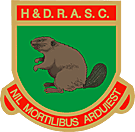 |
|
 |
 |
|
 |

|
Harrogate Railway HistoryTHE club was formed in 1935 by workers at the Starbeck LNER depot and played in the Harrogate League. They progressed successfully and in 1946 won the British Railways National Cup Final. This success prompted the club to borrow £ 1,500 from the LNER to buy the Station View site and secure a permanent home. This was agreed provided 300 rail workers paid I d a week to finance repayments - more than enough subscribed.The 1950's saw the club join the West Yorkshire League, then the YorkÂshire League and the first of two major assaults on the FA Amateur Cup in 1953 with a second-round proper tie at Harwich and Parkestone. Special trains carried fans to the game which Harwich won 3-2. At the end of the fifties the loco sheds were being run down and finally closed in 1959. Finances were adversely affected as many members and players had to leave the area to find work elsewhere. The club soldiered on through the 1960's under the auspices of "Chick" Farr and they almost repeated the Amateur Cup exploits of the fifties when they made the first round proper in 1961, only to go out 4-2 at Whitley Bay. A special train conveyed fans to that game as well. They won promotion to the Yorkshire League first division and an appearance in the Yorkshire League Cup Final in 1964. Those were the highlights of a decade when, until the advent of the Alliance Premier League, the Yorkshire League was only two steps from the Football League itself. However, the late sixties and early seventies were a struggle and Railway were relegated to the Yorkshire League third division and then returned to the Harrogate League in 1973, a move which ironically coincided with the FA abolishing amateur status, and which enabled them to stabilise financially. They were able to rejoin the Yorkshire League in 1980 and became founder-members of the new Northern Counties (East) League (NCEL) in 1982. Freddie Cliff steered the club to promotion from the second division (north) and the NCEL Cup. Meanwhile a new junior structure was formed, thanks to the efforts of John and Mary Lindsay, and quickly grew in stature ÂRailway can now boast football from under-9 to senior level. In the 1990-91 season Railway reached the fourth qualifying round of the FA Cup under Denis Metcalf and future manager Martin Haresign actually played in the 3-1 defeat at Chorley. Floodlights were installed in 1991 and a strong Sheffield United side, including Vinnie Jones, provided the star-studded opposition at the official opening. Management changes and financial difficulties hindered progress as the nineties wore on. However, Dave Fell joined as boss in 1998 and won the NCEL first division, but he departed at the end of the same season, taking most of the team with him. Ex Harrogate Town player and manager Paul Marshall took on the job and had to build a new team which struggled in the first half of the next season, but the club stood by him and a good late run ensured survival in the premier division. The committee's faith in him culminated in two amazing FA Cup runs. The fourth qualifying round was reached for a second time in 200 I, that foray ended with an unlucky 3-2 defeat at home to Morecambe, the winner coming deep into injury-time. But the following year Railway went two better and, after a bewildering qualifying competition, the many who travelled to Berkshire witnessed a 2-1 win at Slough Town in the first round proper. The lowest ranking club ever to reach the second round proper was then drawn at home to Bristol City, the highest ranked club in the competition at that stage. A fairy-tale tie. Railway dumbfounded everyone by opting to stage the game at Station View. Despite many improvements over the years, three huge temporary stands had to be erected, and a monster effort by the club made sure that the ground was capable of being the focus of the football world for a couple of hours in December 2002. Sky TV beamed the game world-wide and the day lived up to expectations. Before a sell-out crowd of 3,500, Bristol City were made to fight for their 3-1 win. Steve Davey netted with 17 minutes to go to make it 2-1, but once again an injury-time goal finally sealed Railway's fate. Unfortunately arguments over players' bonus payments clouded the experience and, despite winning the NCEL President's Cup the same season, Paul Marshall was not reinstated. Leeds duo Dave Harrison and John Francis were appointed but, after just one win in 1I games and early exits from the FA competitions, they stepped down and Martin Haresign was quickly brought in. He signed new players to steady the ship and kept the club in the premier division. The 2004-5 season started poorly but the team recovered to finish third, just missing out on promotion to the UniBond League, and were also pipped in the League Cup final, losing 2-1 to Sheffield at Ossett Albion's Dimple Wells ground. More ground improvements in preparation for UniBond League football were implemented and this time Martin's side, albeit after another slow start, made the top three placing originally stipulated for promotion to the UniBond, the vital victory at Sheffield was probably the best display of the season. History had been made and Railway were set to play at their highest level. The first season in the UniBond proved to confound critics, many of whom predicted a basement finish. This time, however, a good start was built upon and the campaign ended with a mid-table position. Sadly, Martin Haresign had to relinquish managerial duties due to business reasons but Vince Brockie and new assistant Dave Morgan carried on the good work. |
Please Click To Support Our Sponsors Next Fixture is home vs:  Garforth Town 26 Aug 2015 |